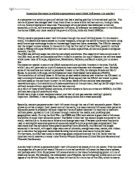Debt repayments channel money from the developing world to the developed world in the form of high interest loans. Even debt relief schemes e.g. the HIPC (the heavily indebted poor countries) have been criticised as it is increasing the dependency of these countries on the World Bank. This international governmental organisation will set up easy ways to get rid of debt but they have to agree to structural adjustment plans (SAP’s) – these plans results in the World Bank controlling the country’s currency and setting the interest rates. This dependency on the World Bank is another way of promoting underdevelopment in the developing world.
There are also patterns of unfair trade between superpowers and LDCs. The world trade system is essentially a western ‘free trade’ one with the USA and the EU being very influential across the world. The world’s three major stock markets (London, New York and Tokyo) are all in the ‘west’. In today’s globalised world emerging powers have started to benefit from world trade, mainly due to the role of TNCs e.g. Nike, which originate from the west. Although countries such as China have gained hugely from this there are still many LDC’s that have been cut off from globalisation ensuring that they stay in a state of ‘underdevelopment’.
There is much controversy over whether the Chinese Foreign direct investment (FDI) programmes in Africa have been a mechanism of neo-colonialism or genuine development. The increasing activity of Chinese entrepreneurs in Africa is beginning to transform the world’s poorest continent; African corrupt governments have previously put a ‘brake’ on economic development however this new wave of investment has meant that these countries can move to the ‘take off’ stage of W.Rostow’s 1960 modernisation theory.
China can teach a lot to the African continent – they have lifted 400 million people out of poverty by combining state intervention in the economy with incentives to attract private investment. China has then reinvested the profits from these exports from FDI in order to industrialise. These stages of development are now being encouraged in China’s relationship with Africa.
China has helped Africa develop in many ways. Since 2004, China has made deals in at least seven resource-rich African countries for a total of $14 billion. In Angola the Chinese have helped reconstruct and stabilise the country after its long civil war. The loans have meant that new roads, railways, water systems, hospitals and school could be built. Nigeria took out similar oil-backed loans to finance gas-fired electricity-generating stations. These arrangements ensure that the African countries involved gain some chance of long term development. Another huge benefit that the Chinese brought to African countries is the creation of ‘special trade and economic zones’ – which were a vital component of the rapid development of the Chinese economy. These areas are tax free zones where the government provide infrastructure and services to allow the development of export-orientated industries, owned by private investors or by the state. 7 of these zones have been created in Africa with the initial expertise and infrastructure investments coming mainly from the Chinese state.
On the other hand, you could argue that the Chinese investment has not been beneficial for African economies and instead has just been done as a mechanism of neo-colonialism. The fact that the Chinese are investing in corrupt countries with bad human rights records suggests that the deals are done purely for economic reasons. All the countries that the Chinese are investing in are usually ‘resource-rich’ therefore it is very beneficial for the Chinese to become geopolitical allies with them e.g. China imports 1 million barrels of oil a day from the huge oil reserves in Angola and it also exploits the large copper mines in Zambia.
You could also argue that the investment is not creating a positive multiplier effect for these economies due to profit leakage and remittance flows leaving the continent (due to the large replacement labour force). There are currently 1 million Chinese workers in Africa and there will be 10 million by 2015 therefore there are not many job opportunities for the locals – the few jobs that are available have low wages and the health and safety regulations are extremely lax. This influx of the Chinese has resulted in inevitable culture clashes and social issues e.g. the Chine mistreating African workers creating cultural tensions. In addition, the Chinese are outsourcing their most polluting industries e.g. leather tanning and metal smelting to the African zones which will create negative impacts in the long run.
In conclusion I believe that the Chinese FDI programmes in Africa are a mechanism of neo-colonialism rather than genuinely trying to help them develop; only ‘pockets’ of Africa will benefit from the investments and the poorest LDCs will not, creating greater inequality across the continent. If the Chinese are genuinely helping the African continent then they would provide a more equal spread and target the neediest countries. Although this industrialisation may bring employment opportunities, new technology, training and tax revenue, as well as much-needed infrastructure – I believe that the profit leakage, pollution and low wages that are created outweigh the benefits of the investment and therefore the Chinese are not benefiting these economies. Although these new programmes may look very beneficial for the short term to act as a catalyst for development, however in the long run these countries will struggle to pay off the loans to the Chinese which would mean that they would never ‘take off’ and follow the example set by the Chinese.








